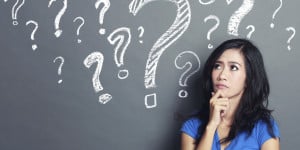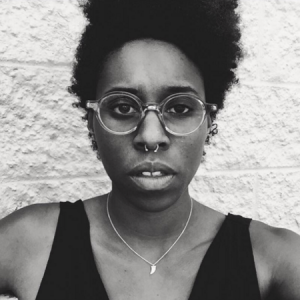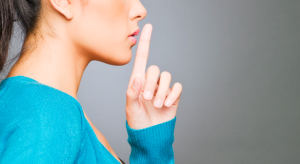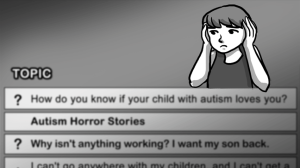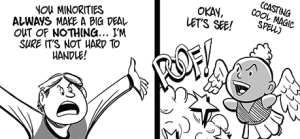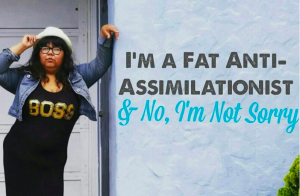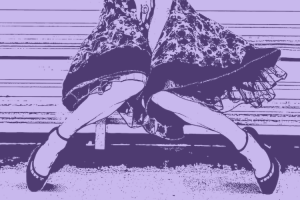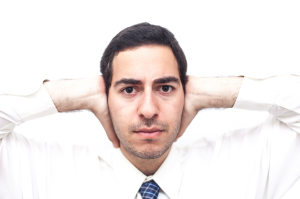Originally published on The Body is Not An Apology and cross-posted here with their permission.
Just last year, when a person very close to me admitted that she was struggling with depression, my initial, internal reaction was disbelief. This can’t be true, I thought.
My next thought was mortification for feeling this way.
Why was it that I, a socially conscious person who believes strongly in mental health advocacy, immediately felt incredulity? I had to be honest with myself. I knew why: I had been raised in a community in which these kinds of things were never discussed.
Here are a few scenarios I am very familiar with:
- An Asian parent commenting on the “strength and resilience” of Asian people to their child, who is secretly struggling with anxiety attacks.
- A non-Asian person telling their Asian friend how they envy “Asian genes,” not knowing that their Asian friend has a family history of depression.
- An Asian girl breaking down sobbing because her primary care physician brushed off her symptoms as “school stress.”
- Despite the skulking thoughts of self-harm and suicide, an Asian college student blaming himself for everything, for not doing enough, for not being strong enough.
I can’t even count the number of times in my life that I’ve heard misinformation about Asian American and Pacific Islander (AAPI) mental health – both inside and outside of the AAPI community. This is something we don’t talk about, and that has to change.
The myth of Asian American people as a “model minority” is problematic and harmful for myriads of reasons, especially because of its historical roots in anti-blackness.
This myth is not simply a microaggression or an incidental by-product of benevolent racism, but a point of view that was purposefully constructed to uphold structural injustice. It harms all people of color – including Asian people, but especially non-Asian people.
That said, there is an aspect of the model minority myth that is rarely talked about: the notion that Asian American people do not experience mental health issues.
From this perspective, the model minority myth is particularly damaging for Asian American folks. Through the false lens of the myth, Asian Americans are perceived as healthy, wholesome, straightforward, and uncomplicated. It presents a deceptive picture of their mental and physical health.
The AAPI community is obviously not homogenous. There are vastly different factors affecting different Asian, Asian American, and Pacific Islander groups.
For instance, according to the National Collaborative for Asian American Women’s Mental Health, 17% of Chinese Americans suffer from depression, whereas up to 71% percent of Southeast Asian refugees suffer from depression or anxiety disorders.
However, across the board, members of the AAPI community are undiagnosed and untreated for all types of mental health challenges.
According to various studies, 18% of Americans nationwide seek mental health services, but only 8.6% of Asian Americans seek out the help they need.
Studies have already linked mental health issues in the Asian American community to factors such as immigration, acculturation, assimilation, war, poverty, and other inter-generational trauma.
These pressures are evidenced by the fact that foreign-born Asian Americans have higher suicide rates than American-born Asian Americans.
As a population that is fundamentally comprised of immigrants and refugees, Asian Americans already face impediments that prevent them from accessing necessary health care.
They are obstructed from the resources they need by language barriers, economic limitations, and cultural differences. All of this, compounded by the stigma of the model minority myth, means that Asian American access to mental health resources is dangerously restricted.
According to The National Collaborative for Asian American Women’s Mental Health, Asian Americans as a demographic have the lowest utilization rate for mental health services, but are far more likely to be diagnosed with psychosis in inpatient and outpatient settings. In other words, the rates of mental illness in Asian American communities are statistically very high, yet Asian Americans are not seeking the help they need.
Why?
Although there are numerous complex factors bearing on this question, one of the prevailing unaddressed issues continues to be the fictitious image of Asian Americans as a group that does not struggle with mental health.
When Americans consider mental health issues of all types – depression, eating disorders, anxiety and panic disorders, dissociative disorders, bipolar disorder, addiction, and so on – they don’t tend to associate them with Asian Americans. Yet there are Asian Americans who are struggling with all of these – oftentimes alone and unaware.
There is a widespread cognitive dissonance here.
If anybody ever directly said “Asian Americans don’t suffer from mental health issues” aloud, they would hear how ridiculous that sounded. Yet people both in and out of the AAPI community seem to hold this belief without ever directly confronting or questioning its implications.
The “model” image of Asian people contradicts the very real struggles going on in peoples’ lives.
For instance, Asian American women have the highest life expectancy of any group in the United States and yet, in multiple age groups, they also have the highest suicide rates.
How do we reconcile these two statistics?
They actually don’t contradict each other at all, yet it seems nearly impossible for many people to hold these multiple truths. This inability cuts alarmingly into prevention, treatment, and education efforts for the Asian American community.
Doctors, especially primary care physicians, have a responsibility and an opportunity to reduce the number of undiagnosed and untreated patients. Doctors are human beings mired in society just like anybody else, so they, too, are susceptible to conscious or subconscious beliefs about the model minority myth. Even doctors who are aware should use culturally competent approaches.
In many Asian families, especially immigrant families, there are systemic cultural barriers that hinder diagnoses and treatment.
Various beliefs about shame and honor can affect access to care, as well as beliefs about healthcare and disease. Emphasis on values that prioritize discretion, stoicism, and diligence also play into the stigma. Mental health problems are often seen as personal weakness or moral failing.
Also, because talking openly about emotions is taboo in many Asian families, mental health issues are often incorrectly placed in that box. Asian Americans who buy into the model minority myth include people struggling with mental health issues, and parents and guardians of people struggling with mental health issues.
An example: In 2003, Teddy Chen, a social worker at the Charles B. Wang health center in Manhattan’s Chinatown, conducted a psychological survey of Chinese American adolescents. Alarmingly, he discovered that 12% of them exhibited signs of depression. Yet when Chen reached out to the families to recommend psychological resources, the vast majority of the children’s parents declined the help.
The stigma is strong.
I’ve heard many people in my community express beliefs such as:
- “If people know that my child is struggling with this, everyone will look down on us, so we must hide it.”
- “If your will is tough enough, you can fight through any sadness.”
- “Depression is not real. It’s a made-up disease.”
The fact that these beliefs are harmful and wrong is absolutely not an indictment of Asian cultures or Asian families. They are an indication that the system needs to be fixed, and that we as individual members of the community need to do better as well.
Advocates such as parents, guardians, spouses, siblings, friends, teachers, doctors, and counselors need to be vigilant. They need to believe the people in their lives. To heal, we need to begin humanizing and destigmatizing. We need to recognize that health at every level is holistic. We need to go back to the roots of these problems, rather than asking “How did this happen?” every time we again grieve another member of our community taken by suicide.
This is a problem than can be fixed – as long as we actively decide to do better.
[do_widget id=”text-101″]
Julie Feng is a writer and educator who is committed to intersectional social justice work. She is the recipient of the Academy of American Poets Award, the Joan Grayston Poetry Prize, and the Arthur Oberg Prize for Poetry. Her poems have appeared in Pacifica Literary Journal, Mare Nostrum, A River & Sound Review, Quaint Magazine, and more. She is from Taiwan, based in Seattle, and currently living and teaching in Morocco.
Search our 3000+ articles!
Read our articles about:
Our online racial justice training
Used by hundreds of universities, non-profits, and businesses.
Click to learn more
Most Read Articles
- « Previous
- 1
- …
- 30
- 31
- 32


